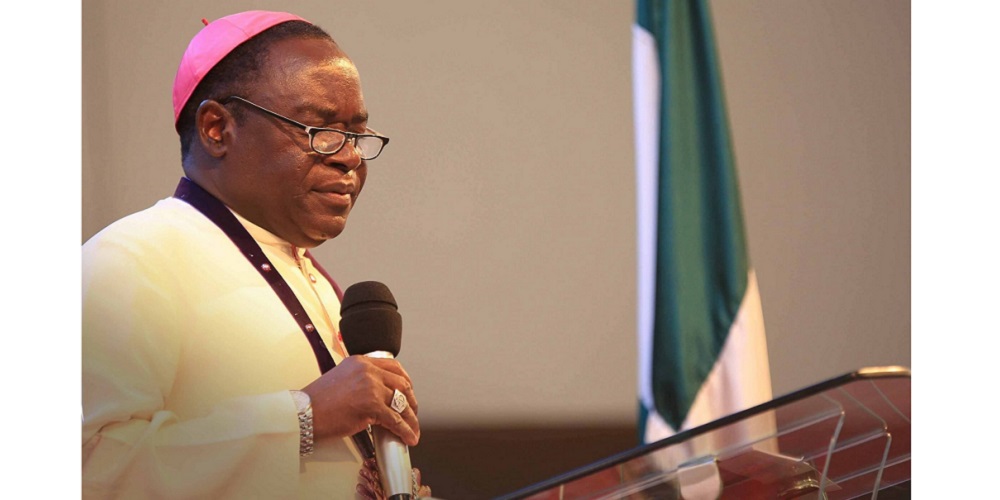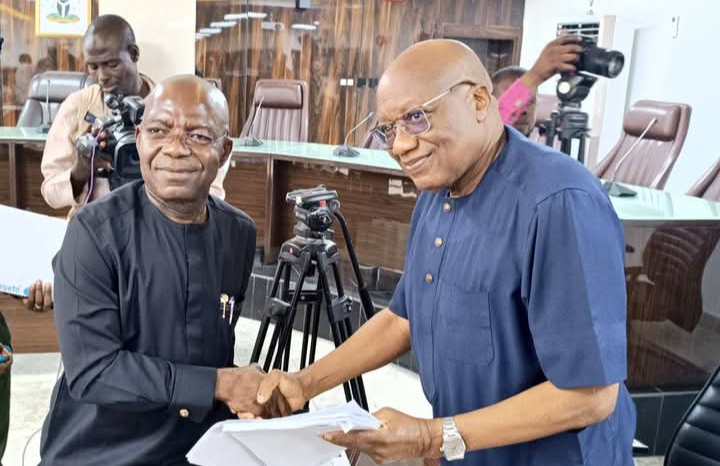News
Nigerians Lining Up To Collect Palliative Is Height Of Indignity, Says Bishop Kukah

Bishop Matthew Kukah has faulted the distribution of palliative to Nigerians in the wake of the biting hardship facing the country.
The government’s floating of the naira and the removal of fuel subsidy have pushed inflation levels to a new high leading to a hike in the cost of living.
Governments across levels have rolled out palliative measures including the distribution of food items to the vulnerable as part of moves to cushion the hardship in the country.
But Kukah, who is the Bishop of the Catholic Diocese of Sokoto, says such moves are undignifying and governments should map out better plans to tackle the nation’s issues.
‘Nigerians Not Looking for Handouts’
“We need to see a much more robust programme designed by the government to help us go away from just lining up and collecting palliative when we are not at war,” the cleric said on Channels Television’s Sunday Politics
“I think it is the height of indignity to see Nigerians lining up every day under the sun and waiting to collect bags of rice which probably never come not because money has not been given but because everybody who gives out money in Nigeria from the Federal Government knows that a good part of this money is always stolen. Nigerians are not looking for handouts.”
”There is a feeling that at the top there is no political will…I believe the Nigerian military is pretty well-equipped. The question we should ask ourselves is why fighting insecurity has been so much institutionalised”#SundayPolitics
He suggests the Federal Government should tackle insecurity to fix the situation.
“Ordinary farmers just want to go back to their farms. People just want to be able to get back to their lives. Ending insecurity is the beginning of this healing and a decisive programme and plan to end is the beginning of the healing,” Bishop Kukah insists.
News
Just in: Sam Olumekun takes over as INEC’s Acting Chairman

Mr. Sam Olumekun has taken over at the Independent National Electoral Commission (INEC) as Acting Chairman.
Olumekun is INEC’s National Commissioner in charge of Information and Voter Education.
He performed his first duties today, receiving a high-level delegation of the Labour Party (LP) at the Commission’s headquarters in Abuja with other National Commissioners in attendance.
The delegation was led by Abia State Governor Dr. Alex Otti, who visited the Commission to discuss key developments within the Labour Party.
It was gathered that both parties engaged in discussions centered on enhancing collaboration and reinforcing democratic values.
During the visit, Governor Otti formally presented a Certified True Copy of the recent Supreme Court judgment concerning the party’s leadership.
He noted that the meeting was aimed at fostering clarity, mutual understanding, and institutional alignment regarding the Labour Party’s current structure.
Mr. Olumekun, the Acting INEC Chairman, reaffirmed the Commission’s unwavering commitment to neutrality, transparency, and the rule of law in the discharge of its constitutional responsibilities.
Recall that a viral WhatsApp message had indicated that Prof. Mahmood was sacked by President Bola Tinubu and replaced with one Prof. Bashiru Olamilekan.
“INEC Chairman Prof. Mahmud Yakubu has been replaced with Prof. Bashiru Olamilekan by President Tinubu,” the message, which had no attribution, read. However, both INEC and the Presidency debunked the widespread report.
Yakubu, who is rounding off his second tenure in office, is expected to exit the system towards the end of this year.
The process of appointing an INEC chairman is the President nominating a candidate and forwarding his particulars to the Department of State Services (DSS) for profiling.
After such screening, the President, thereafter, takes the name to the National Council of State for its advisory review.
Based on the outcome, the President sends the name to the Senate for screening and confirmation.
News
Crude oil prices slide further, now selling below $57

Crude oil prices have dropped below $57, following a previous rate of $59.78.
This decline coincides with the imposition of tariffs on several countries by US President Donald Trump.
A report from West Texas Intermediate attributes this price slump to consistent 6% reductions observed last week.
JPMorgan Chase & Co has warned that these tariffs could likely push both the US and global economies into a recession this year.
The financial institution explained that the tariffs, set to take effect this week, are expected to have widespread economic repercussions.
Market analysts and the business community have expressed concerns about the negative implications of these measures, predicting a slowdown in economic activities and a subsequent decline in oil demand.
News
Niger Republic Junta Abandons French, Adopts Hausa As New Official Language

The military government of Niger has continued its efforts to cut ties with France.
In its latest move, it has officially designated Hausa as the country’s new national language.
Previously, French had served as the central and official language of the nation.
This new development was announced in a charter released on March 31 and published in a special edition of the government’s official journal.
According to the document, the national language is Hausa,” while “the working languages are English and French.”
Before this announcement, Hausa was already widely spoken in Niger, particularly in regions such as Zinder, Maradi, and Tahoua.
Out of the country’s estimated population of 26 million, the vast majority speak and understand Hausa.
In contrast, only around three million people— roughly 13 percent — can speak French.
The new charter also recognises nine other local languages, including Zarma-Songhay, Fula, Kanuri, Gourmanche, and Arabic, as “spoken languages of Niger.”
Additionally, the government has withdrawn from the Organisation Internationale de la Francophonie, a group similar to the Commonwealth that supports French-speaking nations.
In January, French President Emmanuel Macron criticised African leaders for what he described as a lack of gratitude.
Speaking about developments in the region, Macron said: “We had a relationship based on security — it was twofold. On one hand, it was our commitment to fighting terrorism since 2013. We were right, though I think someone forgot to say thank you. It’s okay, it will come with time.
“Ungratefulness, I know too well, is a disease that cannot be transmitted to men. But I say this for all African heads of state who have lacked courage in the face of public opinion.”
“None of them would be sovereign countries today if the French army hadn’t been deployed in the region. My heart goes out to all our soldiers, some of whom have given their lives and fought for years.”
“We did the right thing. We left because there were coups. We were there at the request of sovereign states who asked France to come.”
“From the moment there were coups and the people stated their objectives no longer involved fighting terrorism — or were unclear— France no longer had a place there.”
It’s worth recalling that in December 2023, Niger Republic officially expelled French troops from the country.
-

 News20 hours ago
News20 hours agoOERAF held memorial lecture on conflict resolution, security/safety of community in Nigeria
-

 News6 hours ago
News6 hours agoUS revokes more than 500 foreign student visas
-

 News20 hours ago
News20 hours agoHoR Minority Caucus decries killings in Plateau, Benue states, urges immediate presidential decisive actions
-

 News8 hours ago
News8 hours agoIbas picks administrators for 23 Rivers LGs(SEE list)
-

 News13 hours ago
News13 hours agoBandits have seized control of 64 communities in Plateau – Gov Muftwang
-

 News5 hours ago
News5 hours agoBanditry:” I was chained for 32days while in their den, killed my wife as I watch-Nat’l Assembly DD narrates experience
-

 Economy12 hours ago
Economy12 hours agoMobile Money transactions hit $1.68trn in one year
-

 News8 hours ago
News8 hours agoSAD! Roof Collapses At Nightclub Kills 44, Including province Gov






